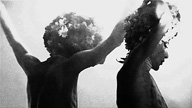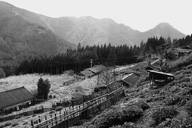PROGRAM F the political is personal, too
Proposing a personal and subjective point of view, early first person documentaries emerged as a counter-culture in reaction to a documentary form that was controlled by a privileged few and claimed to be an “objective and neutral presentation of information.” In the 1970s in America, the genre synchronized with feminism and gay and civil rights activism as artists loudly voiced the slogan “the personal is political.”
And today. In leading countries where democracy supposedly makes good, political correctness seems to dominate ethics. Can it be that the personal and individual voice is under threat? In The Parade, the filmmaker passes through the process of freeing himself from the illusion of a united gay community and to paint his own life as a gay individual. The filmmaker’s father in Harimano confesses in a private moment with his daughter that he is exhausted from his lifelong commitment to politics and the labor movement. This family story is not a singular one, but one of a hard-working generation that under the banner of a cause, carried post-war Japan to what it is today. It inspires us to contemplate the personal lifestyle in today’s mass society.
 The Parade (Our History)
The Parade (Our History)
La Parade (notre histoire)- SWITZERLAND / 2002 / French / Color / 35mm / 78 min
Director: Lionel Baier
Script: Lionel Baier, Laurent Guido
Photography: Lionel Baier, Sylvie Cachin
Editing: Christine Hoffet
Sound: François Musy, Gabriel Hafner
Music: Camille Saint-Saens
Production Companies: Ciné Manufacture CMS SA, Television Suisse Romande
Source: Ciné Manufacture CMS SA
While filming the organizers of a gay parade in a conservative provincial town for seven months, the city-bred filmmaker who never had to become an activist to be gay, discovers himself undergoing change.
 Lionel Baier
Lionel Baier
Born 1975 in Lausanne, Lionel Baier has worked as the co-manager and programmer at the Rex cinema in Aubonne since 1992. In 1996, he began working as an assistant director for various films and commercials while studying art at the University of Lausanne, and began studying cinema the following year. Since 2001, he has been head of the Cinema Department at ECAL (Ecole Cantonale d’Art de Lausanne). Filmography includes documentaries such as Celui au Pasteur (2000) and Mon pere, c’est un lion (Jean Rouch, pour memoire) (2002) as well as fiction films such as Garçon stupide (2004). |
 Harimano
Harimano
- BELGIUM / 2004 / Japanese, French / Video / 56 min
Director, Sound: Tanaka Aya
Photography: Valentine Paulus
Editing: Michèle Hubinon
Music: Duke Quarcoo
Appearance: Tanaka Yasuo
Production Companies, Source: Cobra Films, Zeugma Films
The Belgium-based filmmaker returns with her father to the mountain village in Shizuoka Prefecture where he once faced discrimination for his communist ideas. The father-daughter reunion, in the clear air surrounded by green mountains, reflects something of Japan’s post-war history.
 Tanaka Aya
Tanaka Aya
After graduating from high school in Japan, Tanaka Aya continued her studies in France and Belgium. Attaining a degree in Literature and Cinematographic Analysis at the Université Libre de Bruxelles in 1999, she has worked as a Japanese language teacher since 2000. She directed a short documentary in the six-part series Interface in 2001, and has lived in Belgium for thirteen years. |
Swiss Café in Sakura
It’s a film festival, so we’ve transformed Sakura, a traditional Japanese warehouse remodeled as a café and gallery, into a little piece of Switzerland! Every evening during the festival program’s run, Sakura will be the site of a symposium with English and Japanese interpreters present. Featuring Jean Perret, the director of the Visions du Réel Film Festival in Switzerland, both foreign and Japanese filmmakers will hold intimate discussions about “personal film” with festival attendees. Themes include “Memories—Cinema as a way of remembering / recreating,” “Intimacy, voyeurism and healing the self—Pointing the camera to the private realm” and “The body and subjectivity.” Discussants will also take a comparative look at differences between the histories of Swiss and Japanese visual culture, modes of personal self-expression and identity formation. Who knows what ideas may unfold in these discussions? Representatives of Pro Helvetia—Arts Council of Switzerland will also give a talk entitled “Swiss Public Support for the Arts.” Admission is free.
